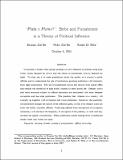|
Reseña:
|
We present a model where groups attempt to exert influence on policies using both bribes (plata, Spanish for silver) and the threat of punishment (plomo, Spanish for lead). We then use it to make predictions about the quality of a country’s public officials and to understand the role of institutions granting politicians with immunity from legal prosecution. The use of punishment lowers the returns from public office and reduces the incentives of high ability citizens to enter public life. Cheaper plomo and more resources subject to official disrection are associated with more frequent corruption and less able politicians. This predicts that violence in a country will typically go together with corruption and worse politicians. Moreover, the possibility of punishment changes the nature of the influence game, so that even cheaper plata can lower the ability of public officials. Protecting officials from accusations of corruption (immunity) will decrease the frequency of corruption if the judiciary is weak and may increase the quality of politicians. These predictions cannot emerge from a traditional model where only bribes are used. |

